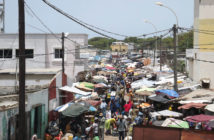“My name is Sid’Ahmed Abeid. I have been a fisherman for more than thirty-five years. In those days, artisanal fisheries in Mauritania comprised only the Imraguen traditional fishing communities fishing for mullet, and the wolof Mauritanian fishermen from the Ndiago region. Then the octopus fishery developed around Nouadhibou. I can tell you about it, because in 1978, I was the first artisanal fisherman who started fishing for octopus.
I remember it well, we were only 17 artisanal boats in Nouadhibou, catching a few fish, like dogfish, – which at home we call tollo– but we were only selling our products for 7 ouguyas, – 2 eurocents – per kilo. In 1978, some people from the Japanese cooperation came to see me and told me that it was possible to catch octopus with pots, and that this would give a very high quality product that we could sell to them at a very good price. So, I decided to give it a go. I tried all kinds of materials to make my pots: cement, PVC, cans – but nothing proved ideal: pots would break; they were too fragile or too heavy.
Then one day, I went to Las Palmas, and I found that the Spanish were selling water in bottles of five liters that were just the right size for my pots. I went to see the people at the bottle factory, and I bought 4000 bottles from them. They adapted them to make pots for me, and I sent them to Mauritania. Results were excellent! And as this happened just after the great drought of 1973, many Mauritanians who had migrated to the coast began to catch octopus with pots, like me. A few years later, in 1984, when the SMCP – the Mauritanian society for the marketing of fishery products – was created, we were the first ones to supply them with our products!
Today, we are more than 35,000 fishers and we have a fleet of 7,500 artisanal boats. And when seen in terms of the overall octopus catches, we, the artisanal octopus fishermen provide 60% of the national production in quantity and 70% in value. We provide 90% of the employment in the fishing sector, with people working in 50 freezing plants, in 12 boat building workshops, in hundreds of stores for the sale of equipment, for fish selling, transporting, etc. The added value of the artisanal fisheries sector is 8 times greater than for the industrial fisheries sector.
I need to tell you as well that fishing with pots is a selective fishing method: the octopus hides in the bottom of the pot, and we take it out by hand. If it is too small, we put it back, alive, in the sea. In any case, as we put quality first, small juvenile octopus are of no interest to us. Secondly, in recent years several measures have been taken towards improving sustainability: we now implement biological rest periods of 4 months a year; we have put in place a minimum weight for octopus catches, of 500 grams gutted, etc
What I’m telling you about here is what I call development, environmental, social and economic sustainable development. And for this reason, we want to have exclusive access to the octopus resource”.



